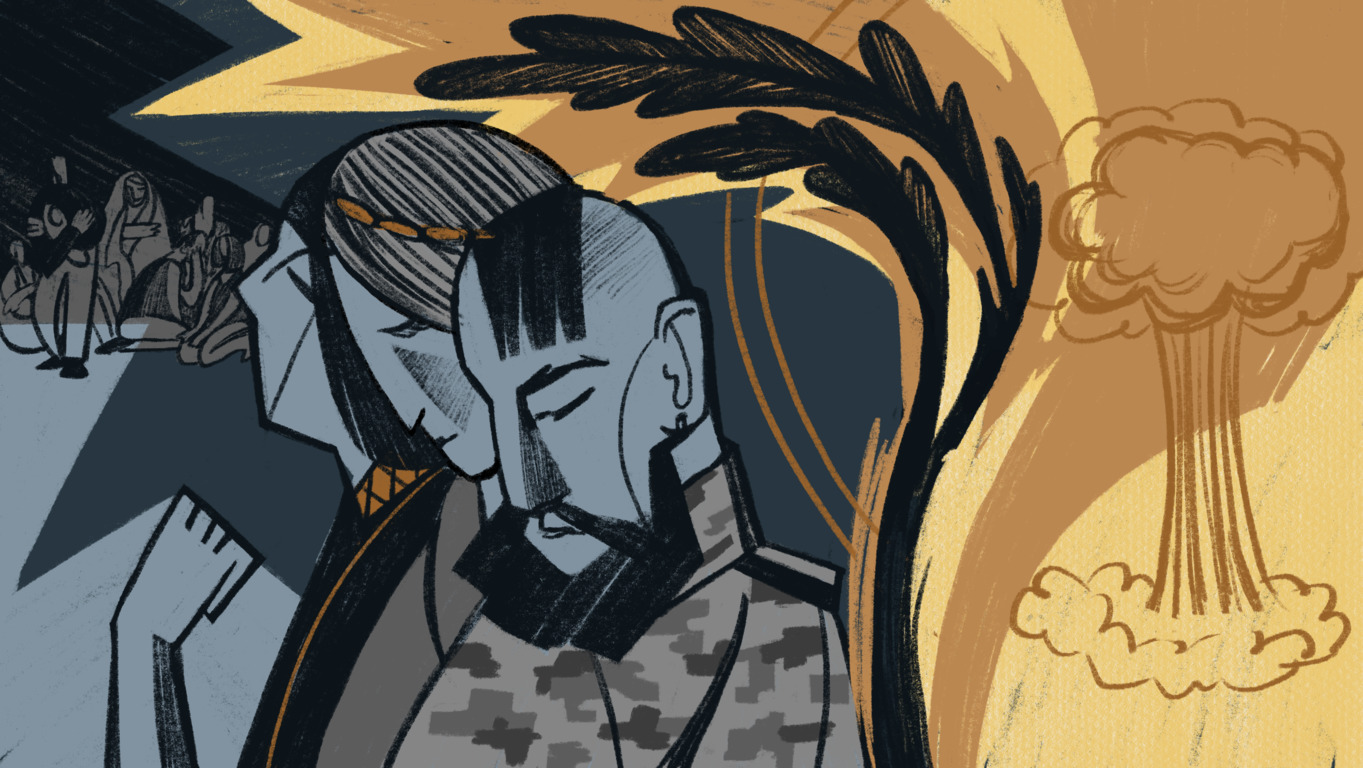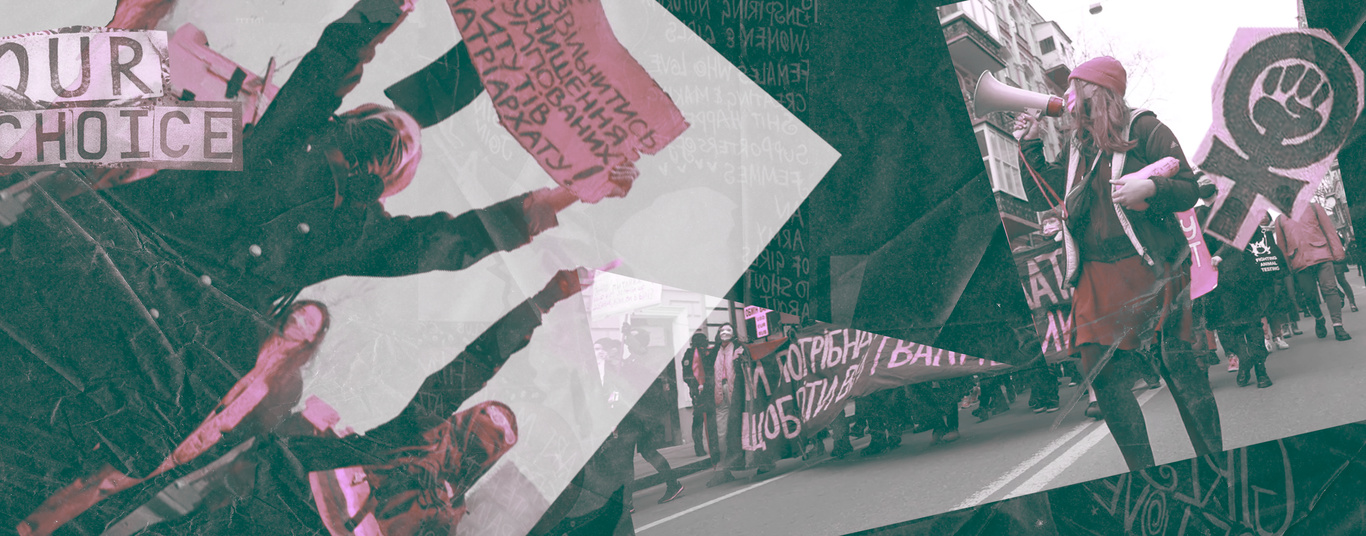For most questions that I am going to examine, I must confess that I have no ready answer. Even worse: in many cases, I fear that these answers do not exist. However, this cannot prevent us from seeking these answers, and before that finding the correct formulation for the questions themselves, with the help of everything that we can learn and critically discuss. The war in Ukraine raises questions of universal interest, and it affects us and will do it increasingly: our present, our collective future, our place in the world. With respect to this war, we are not like distant or neutral observers, we are participants, and its outcome will also depend on what we think and do. We are in the war. We cannot “desert the war”, as my colleague Sandro Mezzadra has written in a solid pacifist manifesto. Which is not to say that we must wage the war in all the forms that are immediately proposed. Our possibilities of choice are probably very narrow, but we must not decide that there are none.
But which war is that? Even this we cannot say with absolute certainty. Because we don’t have a complete perception of which spaces the war is occupying, beyond the obvious territory that was invaded by Russian armies in last February and some adjacent zones. Crucial questions regarding the intensity of the war and about the ramifications of the war beyond Ukraine, perhaps into the whole world, are pending while the war unfolds and progressively changes character. On them also depend the hypotheses that we can formulate about the forms that politics (as an institutional and a collective practice) could take in and after the war (if there is going to be an “after”). In his famous sentence, repeated ad nauseam, Clausewitz said that “war is a continuation of politics by other means”. But an even more decisive question is: which politics can continue during the war, and how will the war transform the conditions and the very content of politics in its aftermath?
I will discuss these issues around three main themes: First, “what’s in a war?”, or which definitions can be proposed for the current war? Second, how does this war redefine the function of nationalism, and the becoming of the “nation-form” itself? Third, how does it articulate several political spaces in a global structure of conflicts and agencies.
What’s in a War?
My hypothesis in this first part is the following: the “character” of the current war is impossible to grasp if we don’t apply successively several “grids” which operate at different levels and highlight different modalities of the conflict. Hence the war is essentially multidimensional: it is developing on several “theatres” at different rhythms. But we must decide which aspect we grant the primacy in our political assessment of the “stakes” of the war, commanding our interventions, at the places where we are located by history and geography (e.g. as European citizens). This decision will be based on our understanding of the factors of the war and their articulation, but ultimately it will be a subjective decision, which cannot be automatically deduced from its own premises.
I believe that the war develops at four different levels simultaneously, which I will try and indicate; but some preliminaries are in order. First, although the character of any war certainly depends on the objectives of belligerents, it is not really defined by their intentions, but by the political constitution of their collective institutions (usually nations), and by the historical conditions in which these institutions find themselves. This leads to a second preliminary: there are many “types” of war. Comparisons are useful, especially if they involve similar actors: in this case, with the American-Iraq war in 2003, or the wars in Yugoslavia in the 1990s, or the war in Chechnya in the early 2000s, the Vietnam War in the 1970s… But they work essentially as counter-examples. In a sense each new war is a new type of war. And third, a war has successive phases of “movement” and “position”, where the balance of forces is shifting: this usually corresponds to mutations in the “borders” within which it is contained. In this case, after the initial phase in which the national forces of Ukraine pushed back the Russian invasion, the war is stuck in a murderous assault against the Eastern lines of defence of the country, returning to its place of departure in 2014 as it were. But it is only with the current development that all the “geopolitical” dimensions are becoming visible.
The first definition that we can give is: this is a war of independence of the Ukrainian nation. This makes comparisons possible with anti-imperialist wars of liberation in the 20th century (like Algeria or Vietnam), or even the constitution of early modern nations separating themselves from the British, the Spanish, the Ottoman empire. True, Ukraine which was a “federal republic” in the Soviet Union, had become formally independent in 1991, when the Soviet Union was dissolved. And it was recognized by the international community. This is crucial because it characterises unequivocally the Russian invasion as a breach of international law. On one side there is an aggression, on the other side there is a resistance. However, the Russian propaganda made it very clear that Ukraine’s independence was not accepted as fait accompli on the side of the “empire” to which most of the Ukrainian territory had belonged for centuries, and which continued to exist during the communist era despite the democratic principles proclaimed by the October Revolution. Hence it can be said that the Ukrainians are now fighting their war of independence, after which – if they win – the existence of the nation will no longer be disputed. This is achieved however at the cost of enormous destructions and suffering.
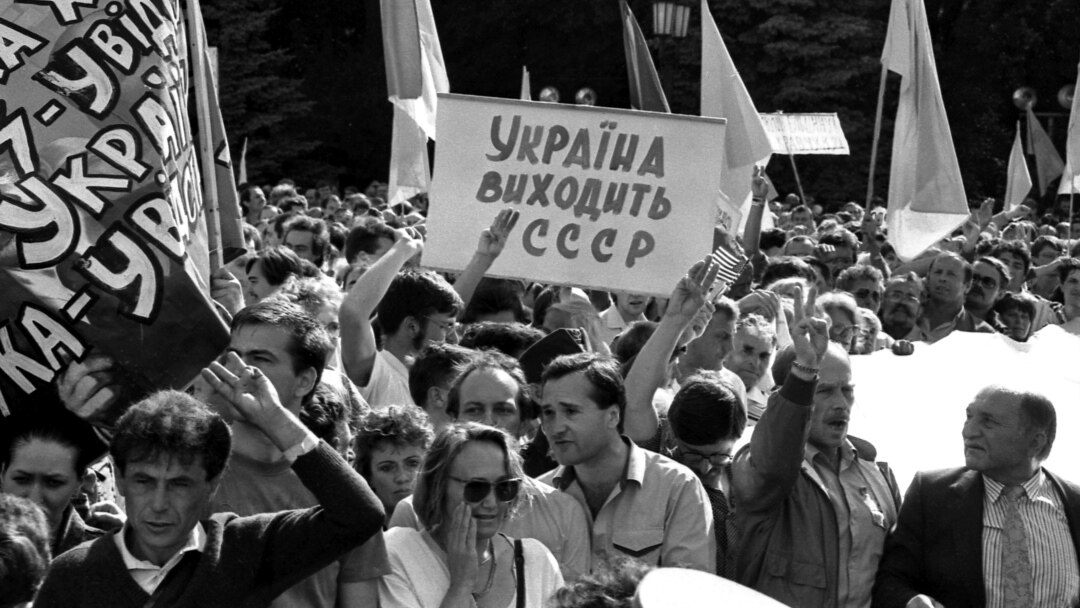
Demonstration in the square near the Ukrainian Parlament on the day of the adoption of the Independence Act of Ukraine. Kyiv, August 24, 1991. The poster: "Ukraine leaves the USSR" / UNIAN
Reference to the continuation of the imperial rule in the “Eurasian” space ranging from the Pacific Ocean to the Polish border and even beyond, and especially to the effects of the Russian Revolution, force us to also consider the war from a different angle and on a different stage. The disproportion of forces (and destructions) is huge, and there are some significant constitutional differences, but like the wars in Yugoslavia in the 1990s this “war of independence” also belongs to the category of the post-communist wars, which arise from the collapsing of former “socialist states” in Europe, and the failure of their “politics of nationalities”, which in the end only intensified hostile nationalisms (further inflamed by the wild policies of neoliberal “primitive accumulation”). This draws our attention to the fact that, in the perspective of one century, this war is not only a European war, opposing European peoples, European nation-states and, around them, European power structures and alliances, it is a continuation, or a new episode in the tragic history of the European civil war that began with World-War One, was reshaped by the October Revolution, then by the emergence of Nazism in defeated Germany with its network of fascist allies throughout Europe, hence World War II, and finally the Cold War and the “iron curtain” that collapsed in 1989. This is a tragic history full of regime changes, the destruction and restoration of nations, genocides and massacres, totalitarian dominations whose traces are not completely liquidated. If we see the current war from this perspective, the “total war” that is currently waged in Eastern Ukraine and the exodus of million people are not in any way justified, but they are less surprising. This is a repetition of an existing pattern, which had been too easily forgotten, because it was assumed that the underlying problems were “resolved”.
However, this second definition immediately leads to a further broadening of the scope in which to insert the war. 20th century European Wars were also “world wars”, or parts of “world wars”, with a more or less “central” place granted to Europe. I would say that the current war is rather a “globalized war”, or it is on the way to becoming a “globalized war” albeit of a “hybrid” character, in which many parts of the world, their political structures and populations are involved in a dissymmetric manner. This arises from the fact that the immediate belligerents are parts of global alliances which provide support and can be said to wage a “war by proxy”. Given the ambiguous attitude of China in the conflict, this is especially true on the “Western side” of course. Without permanent flows of arms and information, the Ukrainian army with all its virtue would not be able to resist the Russian assault. And the West is waging also an “economic war” on Russia. It is highly significant that, while Russia officially denies that it is waging a war, calling it a “special military operation” (as in colonial wars of the past), the West also denies that it is involved in a war, but speaks of “sanctions”. Above all, what is important here is the fact that the combination of destructions caused by the war, blockade imposed on exportations of corn and other agricultural products, and repercussions of sanctions on the global economy, opens the dramatic perspective of a food shortage which threatens populations in the Global South with famines: they too are now “in the war”.
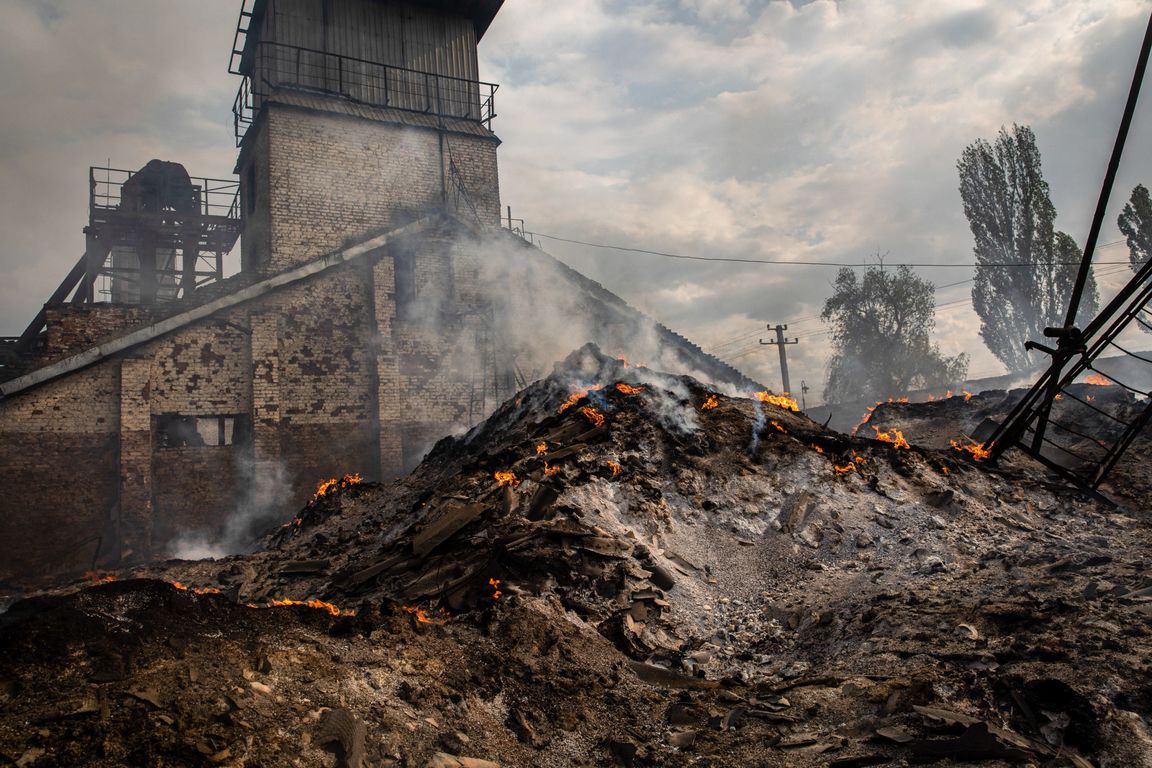
The ashes of burnt grain in the town of Sivers’k, Donbas. May 2022 / Alex Chan / SOPA Images / Sipa USA via Reuters.
Finally, there is a fourth determination of the war that can’t be left aside, haunting its margins as it were: the possibility that it becomes a nuclear war. This disturbing question was raised by Jürgen Habermas in a recent paper which launched a controversy in Germany. Many commentators believe that the use of nuclear weapons in the war is an instrument of “blackmail” by the Russian regime. Others suggest that the Russian invasion is a “colonial war with a nuclear umbrella”, which forces the other side (the Western coalition, unified under NATO) to limit the magnitude of their help and the scope of their intervention. But this misses the point, which has to do with the fact that a “rise to the extremes” is never excluded in a total war if it does not end with a clear advantage on one side, and the fact – rightly emphasized by Günther Anders or Edward Thompson at the time of the Cold War – that the existence (and magnitude) of nuclear weapons creates catastrophic possibilities which are not controlled by the political regimes and their leaders. “Exterminism”, to put it in Thompson’s words, is not “unthinkable”.
So, we are back to the necessity of deciding how we hierarchize in our judgments these heterogeneous dimensions which, nevertheless, are not independent. My position – a fragile one I am aware – is that there is an immediate urgency to support the resistance of the Ukrainian people, which is waged in the name of the independence of their nation, not because national independence is an absolute value per se, but because it is clearly their right of self-determination which was denied, and because they are the victims of criminal warfare on a mass scale. Their defeat would be morally unacceptable and it would have devastating political consequences on the international order. But this support must not be a blind support. Therefore, I pass now to the other two moments of my discussion, regarding the issue of nationalism and the geopolitics of global spaces and conflicts.
Nations and nationalisms
We might say that the “N-word” is now again at the centre of the political debate, and raises the spectre of genocidal violence, intolerance and exclusions, while forcing us to reconsider the apparent irreducibility of the “nation form” as the ultimate reference for the definition of historical agents. The Ukrainian side is clearly animated by the spirit of “national” unity and autonomy, which can be called “nationalism” – there is no other term. However, we cannot simply draw a line of equivalence with the Russian “nationalist” discourse: this is not only a question of the imbalance of forces and the dissymmetric positions with respect to international law (which sacralises the “sovereignty” of the nations-states provided they are recognized internationally, something which depends on many contingencies). It is a question of their political tenor: the Russian propaganda, exploiting the reality of some extremist groups who played an active role in Ukrainian politics since the independence and the imaginary of the “Great war” against Nazism after 1941, is picturing the Ukrainian regime as a resurrection of “Nazism”.
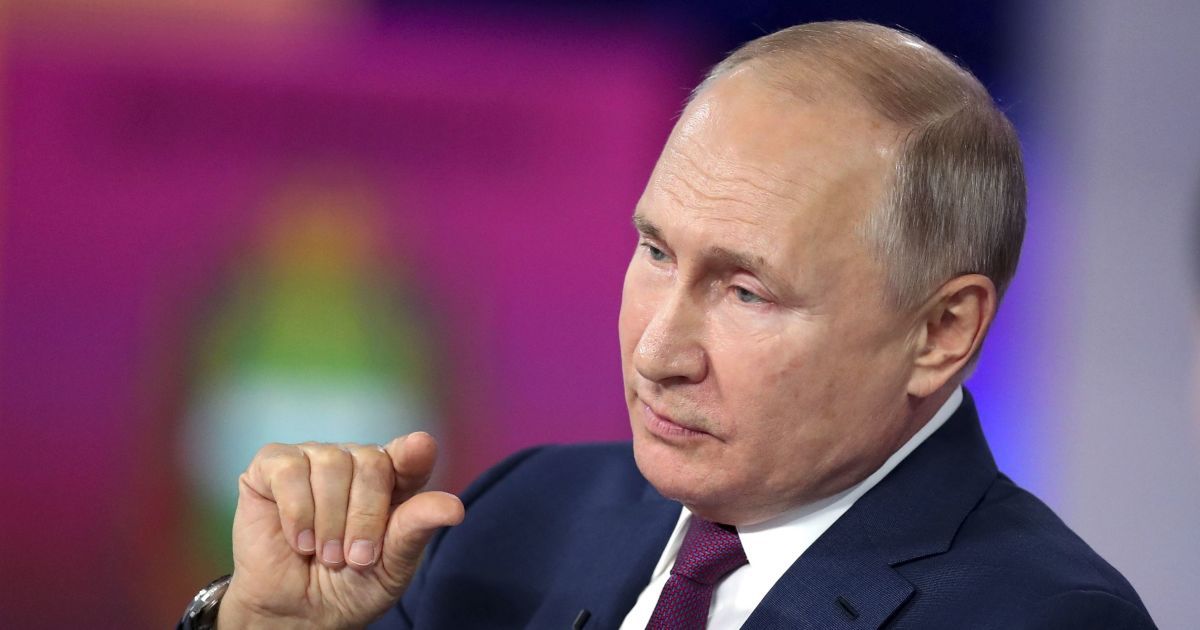
On July 12, 2021, Vladimir Putin’s article “On the historical unity of Russians and Ukrainians” was published, which proclaimed the ideological foundations of the future invasion of Ukraine / Sergei Savostyanov, Sputnik, Kremlin Pool Photo via AP.
But it is in fact the current Russian regime which exhibits totalitarian characters, ranging from the violent suppression of political opponents, to the development of an imperial discourse centred on the historic mission and the superior value of the “Russian people” pictured as a “Master people”. From which I derive two correlative axioms: first, there is no such thing as a “nation” without nationalism, hence an absolute rejection of nationalism as a reactionary ideology per se is meaningless, unless we decide that the nation-form itself should be rejected (which indeed was the position of a large current in the socialist tradition). But, second, the fluctuations of nationalism and the avatars of the nation-form in different places and moments of history are reciprocal. History of nations (largely determined by the wars in which they are involved) generates dramatic changes in the meaning and tenor of nationalist ideologies, which in turn push the nations into opposite directions. Or, better said, what matters politically are the changing proportions, the uneven equilibria of antithetic forms of “nationalism” under a single name. In other terms, we should not try and give an answer to a question of the kind: “what is Ukrainian nationalism?”, but rather: what is it becoming in the course of this war?
Again, I am aware that the hypotheses I will submit are very fragile. They could become refuted very quickly, but perhaps they are worth considering nevertheless. I believe that the neuralgic question, around which the political orientation of Ukrainian nationalism and its political effects revolves, regards the status of “multiculturalism” (beginning with multilingualism) in the institutions of the Ukrainian nation-state. Borrowing categories that are now largely accepted by political sociology in terms of the opposition of the demos vs the ethnos, I will envisage an “optimistic” scenario linked to the characters of the current patriotic resistance, which suggests that Ukraine and its ideal identity is moving from an “ethnic nation” in the direction of a “civic nation”, or a prevalence of the demos over the ethnos. This would result from the remarkable fact that – contrary to the expectations of the invader – the two “linguistic communities” existing in Ukraine, which, we should not forget, largely overlap (meaning that most Ukrainians are bilingual) have joined forces in the patriotic resistance and identified with the idea of an independent Ukrainian nation-state. This seems to be to be a decisive fact, although it is clear that there also opposite forces at work in various parts of the country.
A quick detour through the patterns of ideological discourse is in order here. On the Russian imperialist side, which denies that there can exist a Ukrainian nation, some contradictions exist (which do not prevent the corresponding ideologists to join forces). One discourse is centred on the idea that there exists a single “Russian world”, with a genealogy rooted in the religious and linguistic history of which Ukrainians and their language are just one branch continuously attached to the others, symbolically marked by the “transfer” of the metropolis from Kiev to Moscow. Another one, more similar to colonial discourses in other parts of the world, presents “Ukrainian” as a language and the population that speaks it in terms of an inferior race, or a “people without history”, except through its incorporation and education in the framework of the empire. The two discourses explain how, a contrario, the nationalist narrative was constructed in Ukraine: as a narrative of the continuous existence of the Ukrainian people/nation which is substantially identical with its resistance against destruction of its collective identity pursued above all by the Russian empire. This narrative constructs a mythical continuity between a medieval kingdom called Rus’ whose capital city was Kiev, and a contemporary national revival, despite the complete heterogeneity and discontinuity of these social formations, but with symbolic intermediary manifestations (the “Cossack” principalities, the republican “Rada” during the revolutionary period after 1917). The continuity of course goes with the idea that there is a substantial identity based on the linguistic community that proved impossible to “eradicate” by the imperial power. My aim is not to disqualify this narrative (very similar to other national mythologies in the world), but rather to indicate why the legacy of the past in this region is in fact probably more complex. As its very name indicates, Ukraine (within floating borders over the centuries) is a borderland, where culture and collective “belonging” are marked by multiplicity and hybridity, not lacking violence and social conflicts of course, since it was always torn between rival empires (or kingdoms), subjected to partitions and incorporations into hegemonic sovereignties, demographic revolutions by means of deportations and the introduction of foreign peoples, even genocides (of which there are two in the 20th century: the Bolshevik extermination of peasants through starvation, and the Nazi extermination of Jews through mass executions and the death camps)… The fundamental phenomenon, as I indicated a moment ago, is the bilingualism of the majority of the population, which owes a great deal to the Soviet school-system through which the current educated middle class was created.
These are some of the reasons why I submit that the most important factor in the genesis of the patriotic spirit supporting the fighting capacity of the Ukrainian people in this war is not the ethnic narrative (or this narrative alone), but the democratic invention of the Maidan-Revolution in 2013-2014, which created a notion of citizenship distinct from the ethnic community. This democratic invention is certainly not pure, both because it was permeated with sectarian manoeuvres, manipulations by “oligarchs” and corrupt politicians, even leading to violent confrontations between armed militias, but it is unmistakable as a popular democratic insurrection, especially seen on the background of regional tendencies towards authoritarianism (or “post-democracy”). This is certainly one of the reasons why the Russian dictatorship under Vladimir Putin could no longer tolerate it: because it initiated a critique of the corruption and a collective move towards the official values of the Western European democratic systems (however “oligarchic” they can be themselves, but leaving room for political pluralism) and it could represent a model for the citizens of the Russian federation.
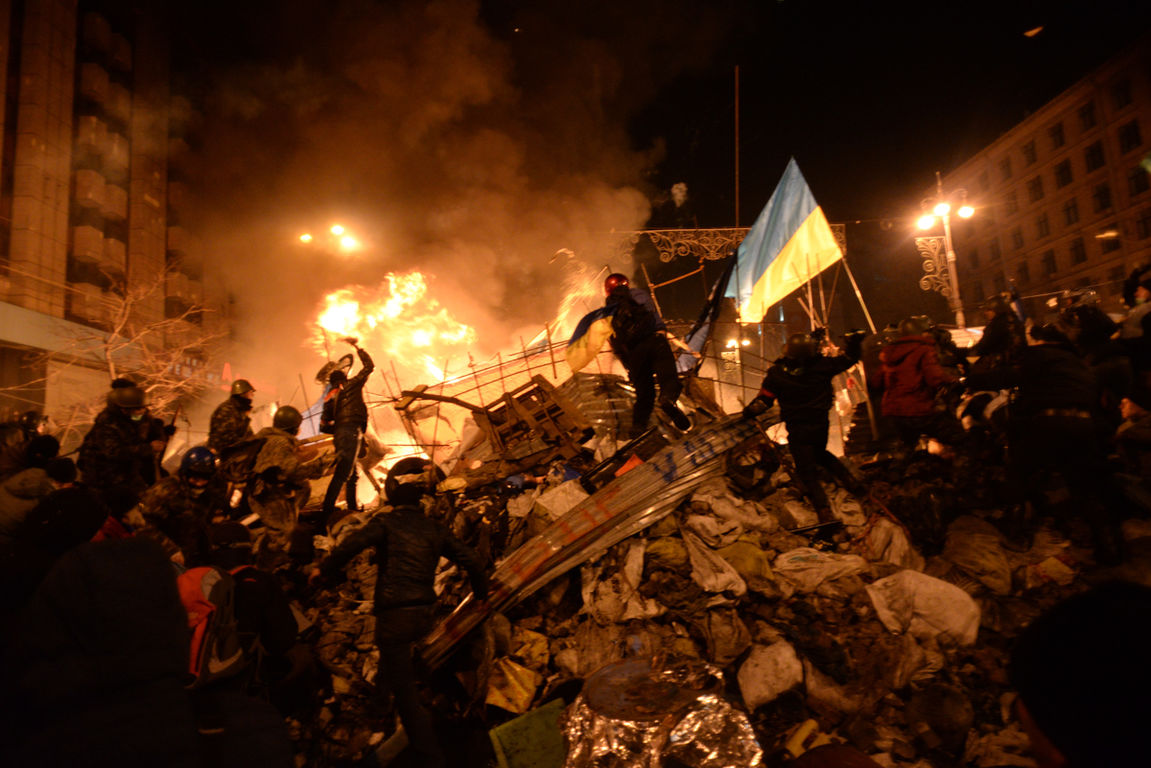
State flag of Ukraine behind the barricade during the fighting on Maidan in Kyiv. February 18, 2014 / Mstyslav Chernov. Wikimedia.
Of course, I am aware that other forces push into the opposite direction: the most powerful among them is the war itself, in particular because it is bound to unleash a russophobia that is aiming not only at Russia as a state, but at Russian culture and language, hence their use and valorisation by Ukrainian citizens themselves. The great unknown of the situation, politically decisive for the future, lies in the evolution of this antithesis.
Geopolitics and supra-national spaces
Finally, I want to return to the idea that the several “wars” that overlap and overdetermine each other in the current situation become intelligible if we attach their respective logics to a consideration of heterogenous political spaces which intersect over the “borderland” that is Ukraine.
Let me begin with a fundamental paradox inherent in the situation, and increased by the war itself: nations that seek their independence, especially if they are struggling against an Empire (or a political entity trying to resurrect a past empire), are eager to assert their sovereignty. However, national sovereignty (even for very powerful nations, a fortiori for smaller ones) was always a “limited” sovereignty, premised on recognition by other nations, and incorporation into systems of alliances. At the height of the imperialist era, it would become a largely formal autonomy, since the world was divided into rival “camps”, albeit not in the same modalities on both sides. This situation is reproduced today, or perhaps we should say that the Ukrainian “war of independence” demonstrates that it had never disappeared, only changing its geography and becoming subjected to different geopolitical relations of forces. What appears today is the fact that Ukraine can defend and save itself only if it becomes incorporated into the military alliance of NATO, i.e., the Western imperialist structure, hegemonized by the US in the service of their global interests, and that it can assert and develop its democratic values (in a liberal sense), only if it becomes a member of the “quasi-federal” structure which is the EU. The two processes, which generate dependency as the real content of sovereignty, are closely interconnected and they might seem indiscernible, as the war itself increases the military integration of the EU member-states, which takes place under the aegis of NATO-membership, where the US is also overwhelmingly dominant. What looked like diverging evolutions of the political and the military in the recent past (since the end of Cold War), appear now again as twin faces of a single process (with a devastating consequence of re-installing a logic of “camps” in the global arena and postponing indefinitely the resolution of what I have called the “European civil war”).
Does this phenomenon vindicate the Russian propaganda which, from the very beginning, explained that the war (not named as such) is a consequence of the aggressive policies of NATO trying to “push back” the ex-communist rival (as some neo-conservative ideologists had planned)? I don’t believe so, because even if NATO had a policy of “surrounding” the Eurasiatic political space traditionally dominated by Russia, which seems undeniable, it did not militarily attack Russia in the first place. We can never forget which armies invaded Ukraine and currently destroy it. In addition, it should be clear that no compromise with the Putin regime or surrender to its demands will resolve the paradox of the acquisition of independence through the subjection to a larger ensemble, whereas on the other side it is also clear to me that there is a complete dissymmetry for a democratic country between the perspectives of being taken and swallowed again by a backward-looking autocratic empire, and the perspective of being incorporated into a federation which creates or perpetuates inequalities, but has set up rules for negotiating participation. A discussion about contemporary forms and degrees of imperialism is in order here, that also includes a distinction between the forms of subjection that they impose. The next step would be to try and evaluate the likelihood that, for Ukraine and for Europe itself, the political integration that will appear as inevitable consequence of the “war of independence” of the Ukrainians, is not completely identified with and subjected to a military integration into a restored transatlantic “camp”. This will depend on the strategic developments of the war itself: how long it lasts, which side “wins” or simply finds itself in a favourable position to negotiate peace or a truce, which solutions are backed or tolerated by the public opinions on each side, where the Russian people must also be counted.
But perhaps the most important consideration remains now to be introduced. We should not see the level of geopolitical conflicts between military alliances and the new cartography of global imperialisms (where China might be the decisive player) as the last resort of the discussion. What I tried to conceptualise a moment ago as the “hybrid character” of a war that is not so much a “world war” than a “globalized war”, might take us into a different direction. Wars are crucially fought about borders and frontiers, and there are several types and layers of them: at one level the national borders defining rules of inclusion and exclusion into a community of co-citizens normally enforced by the States, at another level the “global dividing lines” which distribute the planet and the human population as such among “regions”, which are the effect of colonial and postcolonial hegemonies, uneven development and the localization of different forms of capitalism. We think of the distribution of the world-territories and the world-population between a Global North and a Global South. Clearly, this distribution plays a decisive role in the perception of the war in different parts of the world, particularly feeding the perception largely shared in the South that this is a war among “imperialisms of the North”, perhaps even a “proxy war” waged by the most powerful imperialism, namely the US (although the question whether this is still the most powerful ought to be asked). But what I wanted to suggest was the fact that this distribution, while remaining real (and crucial), is also compounded by other “global” phenomena: global warming and the environmental catastrophe are decisive here. This is a phenomenon that shifts and subverts all borders in the world, particularly the borders between the habitable and inhabitable regions, and the “frontiers” of exploitable regions at the cost of immense destructions of natural landscapes. The war is adding to it a new phenomenon, no less devastating: the possibility or even the likelihood of mass food shortage and famine in the near future in several parts of the world, mostly located in the South which has neither sufficient crops nor monetary reserves to buy a scarce resource at high prices. This is a concrete form of the catastrophe to which we might add the environmental effects of an increased production and use of weaponry. In recent interventions, the French philosopher Bruno Latour, who has close relations with the ecological movements, suggested that two wars are waged at the same time, independent from one another: the war against the freedom of the Ukrainians, and the war against the Earth as a living system. I submit that they are tendentially merging into a single “generalized” state of war, in the “hybrid” sense. The prospects therefore are grim and the capacity to collectively react seems limited.
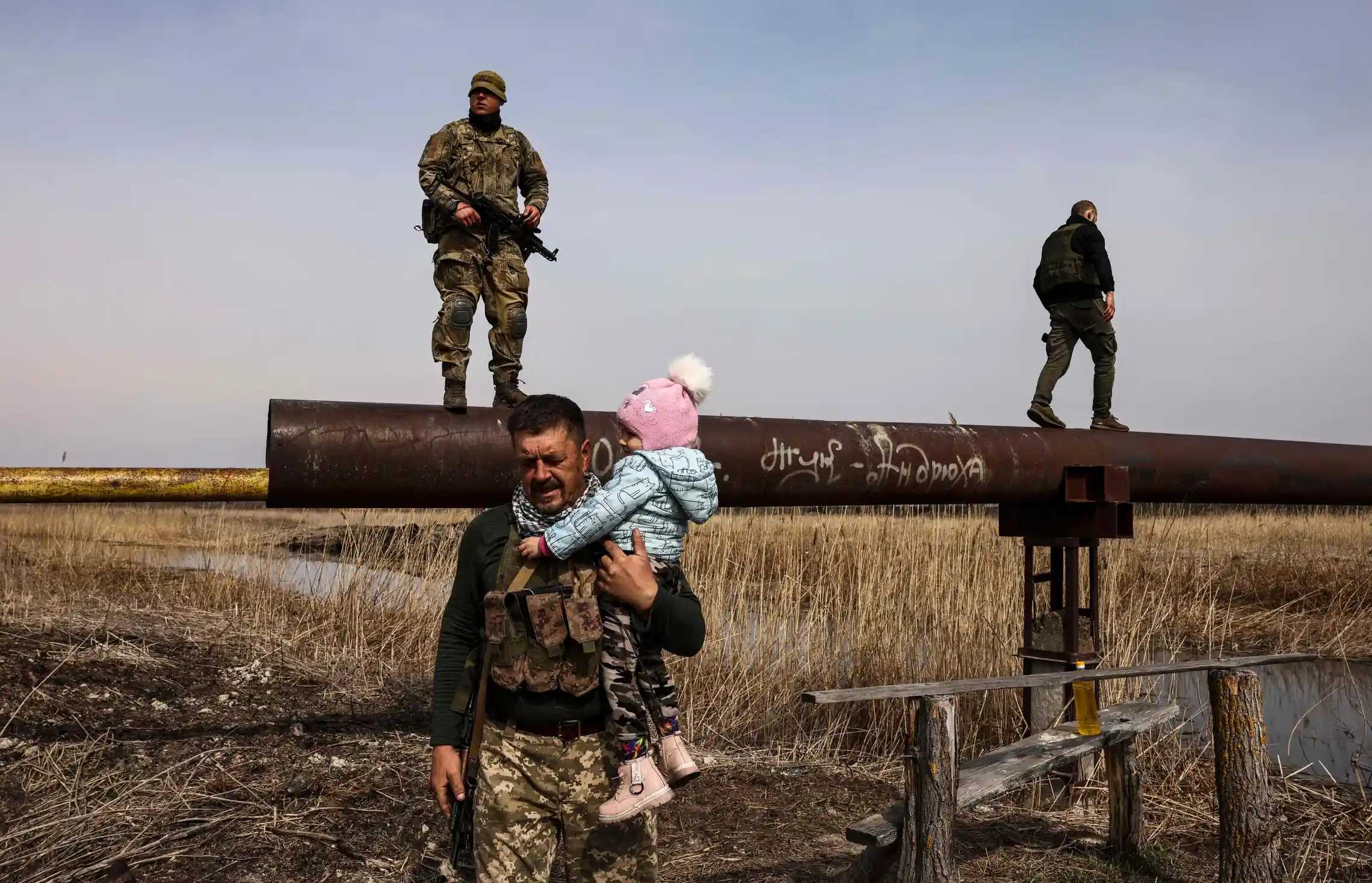
A Ukrainian serviceman carries the baby of a displaced family to help them crossing a river, on the outskirts of Kyiv, on March 31, 2022 / Getty Images
I will not really conclude. Let me just say the following. I do place myself in the perspective of pacifism in the broad, historical sense which belongs to the tradition of the Left, and internationalism that is an intrinsic part of the anti-imperialist repertory. But pacifism finds itself caught in a situation with contradictory exigencies, especially from the point of view of European citizens, as was already the case when fundamental issues of human rights are at stake. As for internationalism, it is more necessary than ever, but seems dangerously disarmed. We must “unconditionally” support a people suffering criminal invasion and mass destructions, who has a right to defend itself and win over its oppressor. On the other side, we must not give up on the idea that the Putin regime is not the same as the Russian people (just as the Nazi regime was not the same as the German people, the Bush or Trump administrations were not the same as the American people, etc.), therefore fight the russophobia and display maximum solidarity with the Russian dissenters, who resist the invasion from inside. We must resume the campaign against nuclear armament and, more generally, seek every occasion to bring back the idea of a different world order, based on the independence of nations and the interdependence of peoples, and the collective security rather than armament, domination and sanctions.
13 June 2022
